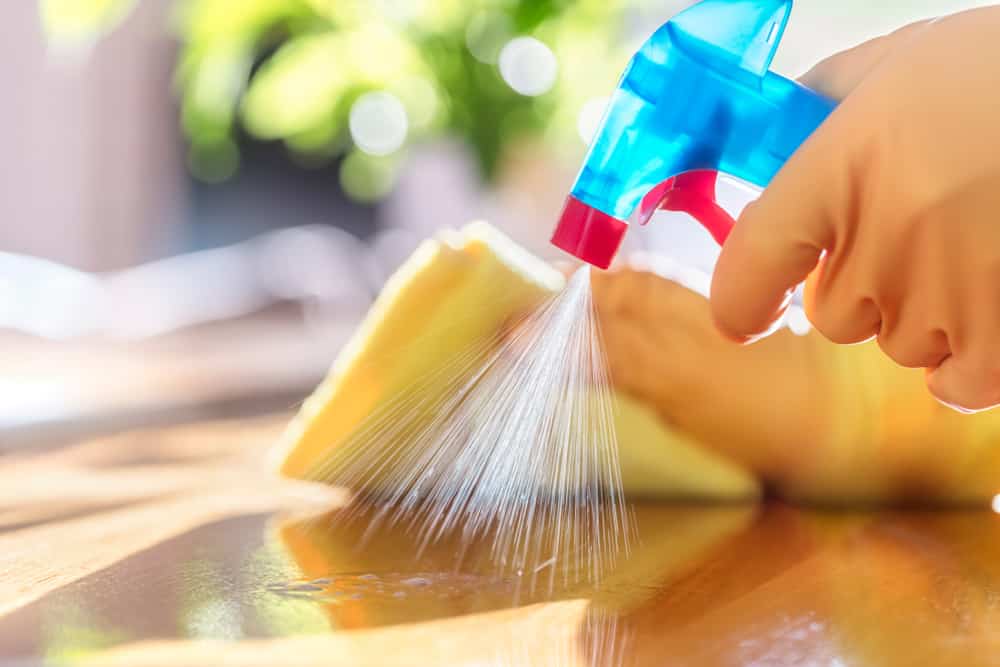Jasmine Birtles
Your money-making expert. Financial journalist, TV and radio personality.


Welcome to the Frugal Column, where I aim to inspire you to live your best life without breaking the bank. You can follow my blog Shoestring Cottage and don’t forget to subscribe to my YouTube channel.
This month I am looking at ways to save money in the garden.
Is your cleaning cupboard bursting at the seams? When your cleaning products are just adding to the clutter in your home, maybe it’s time to simplify things and develop a frugal cleaning routine. The upside is that this will save you money and reduce the chemicals in your environment.
We are constantly brainwashed into believing that we need a multitude of products to keep our homes sparkling and free from germs. One spray for the bathroom, but a different one for the kitchen. A product for the oven, and another for the sink. One for stainless steel and something else for wood. I could go on.
In fact, when you think about the products that our recent ancestors used to clean for centuries, you will realise that keeping our homes shiny and sanitary can actually be quite simple. It is certainly worth experimenting with some old fashioned but effective products like baking soda and vinegar – the sort your great-grandma would have used.
If you prefer something off the shelf, you will probably find that you only require one or two multipurpose products, because in reality many of them are very versatile and contain similar ingredients.
Here are my suggestions for frugal cleaning.
Firstly, it makes sense to use up what you have. Do an audit of your supplies and begin to work through them. Be radical – if you have two bottles of bathroom spray use them up in the kitchen too!
Put yourself on a ban for buying cleaning supplies unless you have literally run out of something (but first read the rest of this post to see if you actually need that item).
The frugal cleaner avoids disposable cloths and wipes at all times. Not only are they wasteful and bad for the environment, they are expensive. Instead, reusable cloths will last for years and save you money.
You don’t even need to buy them. Instead, cut up an old towel or cotton T-shirt. The latter are particularly good to use as dusters and to clean windows and glass, although a microfibre glass cleaning cloth is a good investment.
Steel wool is cheap to buy and great for tough cleaning jobs. It can be put in the metal recycling when it starts falling apart, so there is no waste.
Soak your cleaning cloths in a little bleach, vinegar or disinfectant between uses, or wash them when you are doing a hot wash.
When it comes to simplifying your cleaning cupboard, you may want to invest in just one or two products that can be used for a variety of jobs. However, if you would like to reduce the number of chemicals in your home as well as save money, below are some cheap and effective old favourites that are definitely worth a try.
Washing soda, aka soda crystals, can be used for many jobs. Mix to a paste with water and use to clean your oven, or pour down the sink with boiling water to keep drains free of blockages.
They can also be sprinkled into a bucket of hot water to clean dirty floors and other surfaces. For burnt-on stains and dried-on food on pans and baking trays (but not if they are made of aluminium), mix a strong solution of hot water and soda crystals and leave to soak overnight.
I find a 50-50 mix of white vinegar and water perfect for cleaning and disinfecting work surfaces and chopping boards in the kitchen, as well as cleaning glass and mirrors. For a quick clean of a hard floor you can use the 50-50 mix and wipe over with a damp mop.
Lemon peels mixed with vinegar make an effective cleaning spray. Check out my recipe here.
A quarter of a cup of white vinegar (about 60 ml/two fl oz) can be used in place of fabric conditioner to soften fabrics.

Dip a cloth into some citric acid and use as you would scouring powder. It is excellent for removing limescale.
You can also descale your kettle with citric acid. You will find some instructions here.
This product is another alternative to fabric conditioner for clothes softening. Dissolve 20g or 3/4 of an ounce in 500ml/one pint of water and use exactly as you would fabric softener.
Bicarbonate of soda, also known as baking powder, is an effective scouring agent and can be used to clean baths and sinks. You can also mix it to a paste with some water to remove mould around windows, walls and ceilings.
It has excellent deodorising properties too, so can be sprinkled into the bottom of your bin, in the cat tray and into stinky trainers overnight.
Forget the Shake ‘n’ Vac. Instead, sprinkle baking soda onto smelly sofas, rugs or carpets, leave for half an hour or so before vacuuming. This is especially good at getting rid of pet smells.
Liquid castile soap has a multitude of uses and is an eco-friendly cleaning option. However, it can be pricey. For a cheaper choice, a bottle of Stardrops All Round Cleaner or Dripak’s liquid soap are worth looking out for and will go a long way.
Many of the items mentioned above can be purchased from Dripak. Its website has a lot of detailed information about green and frugal cleaning.
There are so many products that you could stop purchasing to save money and reduce the number of chemicals in your home environment.
A few that spring to mind are plug-in air fresheners, blue solid toilet cleaners, furniture polish, dryer sheets, laundry scent boosters and ironing water. I have a post here on why you don’t need these.
Once you develop a more eco-friendly and frugal cleaning routine, you will find even more items that you can stop purchasing. What eco-friendly and inexpensive products do you like to buy?
